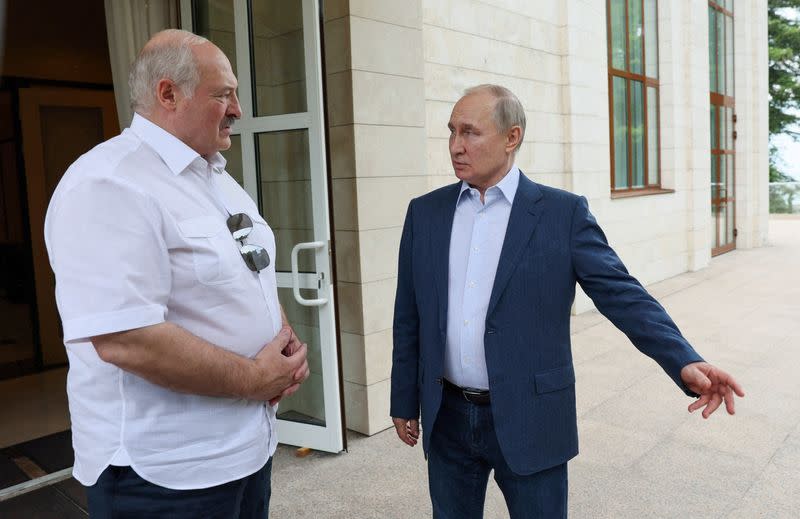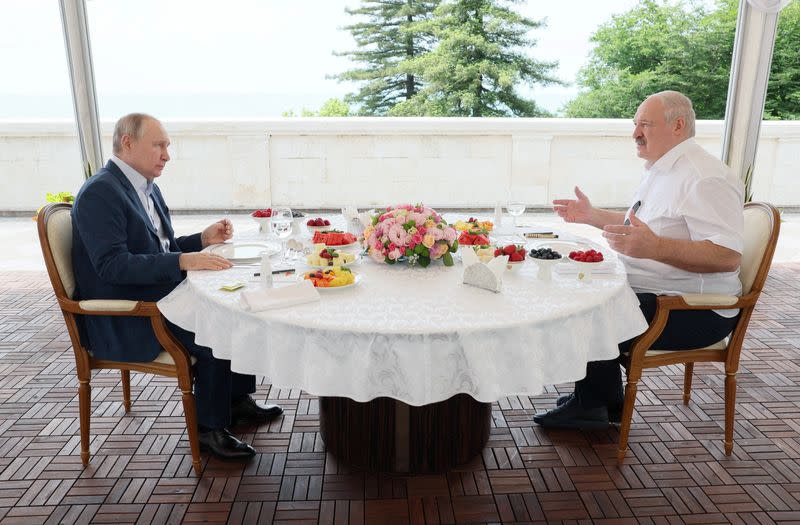Belarus leader, long the supplicant, feted in Russia after mutiny role
By Andrew Osborn
LONDON (Reuters) -Belarusian leader Alexander Lukashenko is usually the one thanking Russia's Vladimir Putin or asking him for a favour - be it a loan, cheap gas, help in navigating protests or tactical nuclear weapons. This time, the shoe is on the other foot.
While the full extent of Lukashenko's role in defusing an armed mutiny on Saturday by Wagner mercenaries aimed at toppling Russia's military leadership remains unclear, the Belarusian leader - derided by Russian officials for years as a useful but volatile and demanding partner - is now being feted in Russia.
It was Lukashenko, according to his own narrative and Putin, who played a major role in ending a mutiny that threatened to destabilise the world's largest nuclear power.
In Lukashenko's telling - something he did in some detail on Tuesday - he was the one who persuaded rogue mercenary leader Yevgeny Prigozhin in phone negotiations to halt his mutiny and who advised Putin not to "wipe out" Prigozhin.
Lukashenko said: "...A brutal decision had been made to wipe out the mutineers. I suggested to Putin not to rush."
It is not immediately apparent what more Moscow, on whom Lukashenko relies for cheap energy to keep his country's Soviet-style economy afloat and whose security apparatus he relies on to ensure his own political survival in extremis, can give him.
But he has at the very least bought himself more political goodwill that he may convert into further financial and economic concessions when the time is right.
Lukashenko has ruled Belarus as - in his own words - Europe's last dictator, since 1994.
According to his opponents, many of whom he has jailed or forced to flee abroad after giant protests against his rule in 2020 and 2021, his actions to defuse the mutiny were likely all about self-preservation.
"Lukashenko was not saving Putin. He was saving himself. He realised that if Prigozhin reached Moscow he would be the first to crumble," Franak Viacorka, chief adviser to exiled Belarusian opposition leader Sviatlana Tsikhanouskaya, told Reuters.
"Lukashenko is so vulnerable right now and so dependent on Putin's will. The likely reward is that Putin will continue to keep him as an exclusive ally and to support him financially and politically. In exchange for that, he will do what Putin wants."
Lukashenko's Belarus is intricately tied to Putin's Russia.
Moscow used Belarusian territory to attack Ukraine from the north at the start of what it calls its "special military operation", has deployed tactical nuclear weapons to Belarus which it retains control over, and has garrisoned thousands of Russian troops there.
Lukashenko, who said there were no heroes in the saga, including himself, acknowledged how closely his own fate and that of his country in its current form was tied to Putin's.
"If, God forbid, this turmoil would have spread across Russia, and the prerequisites for that were enormous, we would be next," he said on Tuesday.
"If Russia collapses, we will all be under the rubble."
RUSSIAN ACCLAIM
Russia's State Duma, the lower house of parliament, opened on Tuesday with a tribute to Lukashenko and Putin and a round of applause.
Putin, in his first address to the nation since the mutiny was called off, thanked Lukashenko on Monday night for "his contribution in peacefully resolving the situation".
High-profile Russian state TV presenter Vladimir Solovyov said Lukashenko deserved to be made a Hero of Russia and Dmitry Peskov, Putin's spokesman, on Tuesday hailed the Belarusian leader as "a very experienced and wise statesman."
At home, where Lukashenko has long cast his strategically important country sandwiched between NATO and Russia as Moscow's younger but staunchly loyal brother, he was also praised as the saviour of Moscow - albeit by his own tightly-controlled media.
Independent Belarusian media outlet Zerkalo (the Mirror), which monitored Belarusian state TV coverage, cited presenter Yevgeny Pustovoi as saying that Minsk was becoming "the peacemaker of Slavic civilisation".
The dust is still settling on a dramatic weekend that has challenged many people's assumptions about Russia's internal politics and stability.
One direct result of Lukashenko's intervention, is clear, however: Prigozhin, who triggered the mutiny and has been a constant thorn in the Russian defence ministry's side for months, is now living in exile in Belarus.
Thousands of his fighters may follow him.
On Tuesday, Lukashenko said there was no need for Belarus to fear the presence of the mercenaries who could share their battlefield experience with his army. "We will keep a close eye on them," he said.
Critics think he may have imported a problem.
"Lukashenko has built a story of himself as the saviour of the world. It will work for his internal supporters and audience," said Viacorka, the opposition adviser.
"But in the longer run Lukashenko doesn't know what to do with Prigozhin's thugs."
(Reporting by Andrew Osborn; Editing by Mike Collett-White and Alex Richardson)



